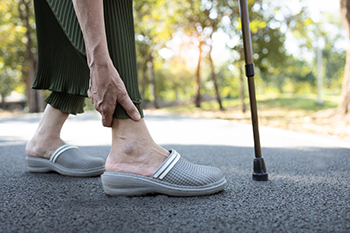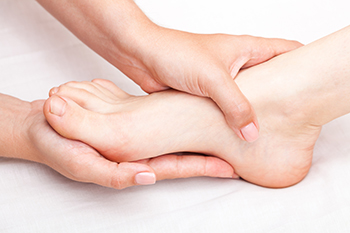Connect With Us
Blog

Bunions are bony bumps that form at the base of the big toe, as the tip of the toe angles toward the second toe. Over time, bunions can become more noticeable, and the skin over the bump may appear red and inflamed. The area can be painful, especially when pressure is applied, making it difficult to wear certain shoes or walk comfortably. Bunions are common in individuals who wear tight or ill-fitting shoes, particularly women who wear high heels. However, they can also be caused by genetic factors, abnormal foot structure, or conditions like arthritis. The symptoms include pain, swelling, and the appearance of a hard bump at the joint of the big toe. A podiatrist can help by diagnosing the condition and offering treatments such as custom orthotics, padding, or even surgery in severe cases. If you are dealing with this condition, it is suggested that you make an appointment with a podiatrist.
If you are suffering from bunion pain, contact one of our podiatrists of Bergen Foot & Ankle. Our doctors can provide the care you need to keep you pain-free and on your feet.
What Is a Bunion?
Bunions are painful bony bumps that usually develop on the inside of the foot at the joint of the big toe. As the deformity increases over time, it may become painful to walk and wear shoes. Women are more likely to exacerbate existing bunions since they often wear tight, narrow shoes that shift their toes together. Bunion pain can be relieved by wearing wider shoes with enough room for the toes.
Causes
- Genetics – some people inherit feet that are more prone to bunion development
- Inflammatory Conditions - rheumatoid arthritis and polio may cause bunion development
Symptoms
- Redness and inflammation
- Pain and tenderness
- Callus or corns on the bump
- Restricted motion in the big toe
In order to diagnose your bunion, your podiatrist may ask about your medical history, symptoms, and general health. Your doctor might also order an x-ray to take a closer look at your feet. Nonsurgical treatment options include orthotics, padding, icing, changes in footwear, and medication. If nonsurgical treatments don’t alleviate your bunion pain, surgery may be necessary.
If you have any questions, please feel free to contact our offices located in Fort Lee, NJ and Flushing, NY . We offer the newest diagnostic and treatment technologies for all your foot care needs.

Elderly foot care is essential, as aging can lead to various foot conditions like arthritis, stress fractures, and fallen arches. Arthritis in the feet causes joint pain, swelling, and stiffness, often making walking difficult. Stress fractures, which are small cracks in the bones, can result from weakened bones and repetitive stress, causing pain, swelling, and difficulty bearing weight. Fallen arches, or flat feet, occur when the arches of the feet collapse, leading to pain and discomfort in the feet, knees, or lower back. These conditions can result from the natural aging process, loss of bone density, or prior injuries. The pain and discomfort can significantly affect mobility and quality of life. A podiatrist can help by providing treatments such as custom orthotics, pain management, targeted exercises, or, in some cases, surgery. They can also recommend footwear modifications to alleviate pressure and improve comfort. If you are dealing with foot pain, it is suggested that you make an appointment with a podiatrist.
Proper foot care is something many older adults forget to consider. If you have any concerns about your feet and ankles, contact one of our podiatrists from Bergen Foot & Ankle. Our doctors can provide the care you need to keep you pain-free and on your feet.
The Elderly and Their Feet
As we age we start to notice many changes in our body, but the elder population may not notice them right away. Medical conditions may prevent the elderly to take notice of their foot health right away. Poor vision is a lead contributor to not taking action for the elderly.
Common Conditions
- Neuropathy – can reduce feeling in the feet and can hide many life-threatening medical conditions.
- Reduced flexibility – prevents the ability of proper toenail trimming, and foot cleaning. If left untreated, it may lead to further medical issues.
- Foot sores – amongst the older population can be serious before they are discovered. Some of the problematic conditions they may face are:
- Gouging toenails affecting nearby toe
- Shoes that don’t fit properly
- Pressure sores
- Loss of circulation in legs & feet
- Edema & swelling of feet and ankles
Susceptible Infections
Diabetes and poor circulation can cause general loss of sensitivity over the years, turning a simple cut into a serious issue.
If you have any questions please feel free to contact our offices located in Fort Lee, NJ and Flushing, NY . We offer the newest diagnostic and treatment technologies for all your foot and ankle needs.

Your feet can provide important clues about your overall health. Changes in their appearance, sensation, or function may indicate underlying medical conditions. Cold feet could suggest poor circulation, while persistent swelling might be a sign of heart, kidney, or venous issues. Discoloration, sores that do not heal, or numbness may point to diabetes or nerve damage. Brittle or discolored toenails can indicate fungal infections or nutritional deficiencies. Foot cramps or muscle weakness could be linked to dehydration or vitamin imbalances. Additionally, dry, cracked heels may suggest thyroid problems. If you notice persistent discomfort, swelling, or unusual changes in your feet, it is suggested that you seek a medical evaluation from a podiatrist who can offer you advice and appropriate treatment.
When dealing with systemic disease of the feet, it is extremely important to check the affected areas routinely so that any additional problems are caught quickly. If you have any concerns about your feet and ankles contact one of our podiatrists from Bergen Foot & Ankle. Our doctors will assist you with all of your podiatric needs.
Systemic Diseases of the Feet
Systemic diseases affect the whole body, and symptoms usually are displayed in the feet. This condition can make a patient’s ability to walk unbearable. Systemic diseases include gout, diabetes mellitus, neurological disorders, and arthritis.
Gout – is caused by an excess of uric acid in the body. Common symptoms include pain, inflammation, and redness at the metatarsal/phalangeal joint of the base big toe. Gout can be treated by NSAIDs to relieve pain and inflammation, and other drugs that lower the acid levels in the body.
Diabetes mellitus – is an increase in the level of blood sugar that the body cannot counteract with its own insulin. Failure to produce enough insulin is a factor in Diabetes.
Diabetes of the Feet
Diabetic Neuropathy – may lead to damaged nerves and affect the feet through numbness and loss of sensation.
Peripheral Vascular Disease – can restrict the blood flow to the feet, and often times lead to amputation of the feet.
If you have any questions please feel free to contact our offices located in Fort Lee, NJ and Flushing, NY . We offer the newest diagnostic and treatment technologies for all your foot and ankle needs.

